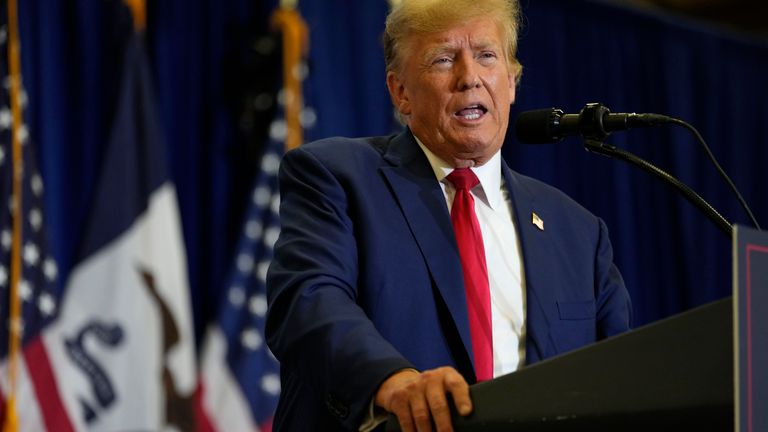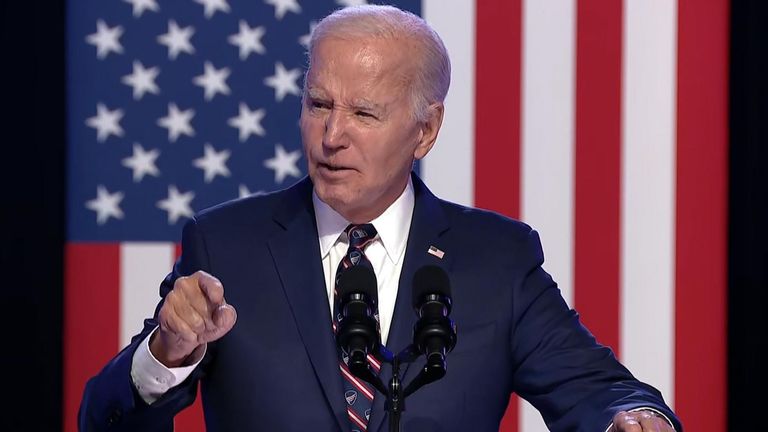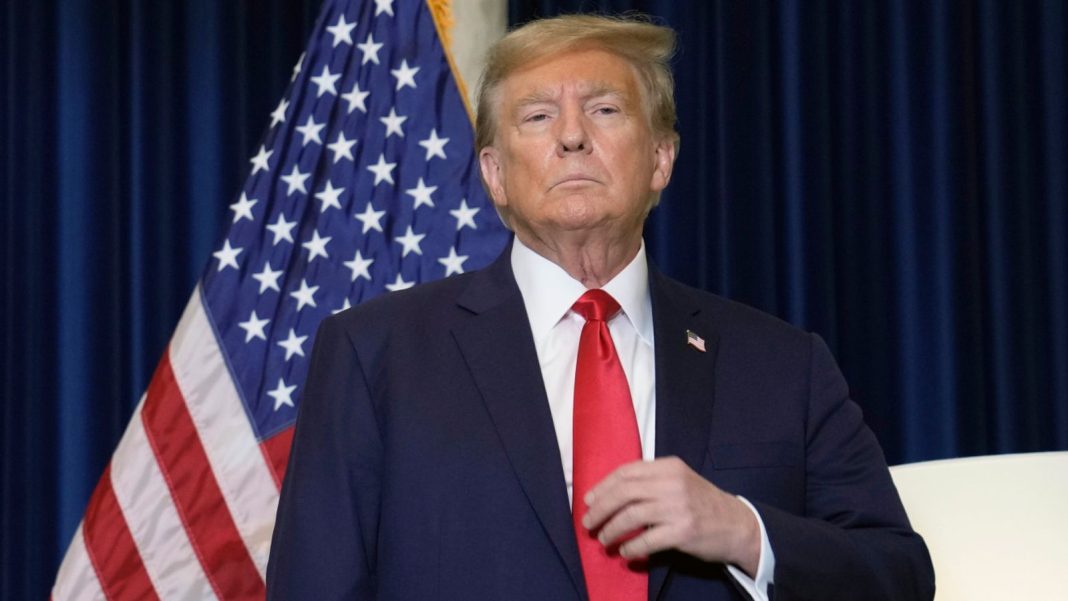Donald Trump has appeared in court as he tries to dismiss a federal criminal case where he faces charges he plotted to overturn the results of the 2020 election.
Mr Trump‘s lawyers argued in front of appeal judges in Washington DC that he was immune from prosecution because he was president at the time of the alleged crimes.
But prosecutors argue he was acting as a candidate, not a president, when he pressured officials to overturn the results and encouraged supporters to march on the US Capitol on January 6 2021, where they stormed the building in a riot.
“The president has a unique constitutional role but he is not above the law,” prosecutor James Pearce argued in court.
Please use Chrome browser for a more accessible video player
7:22
Trump: ‘You have to have immunity’
Trump protests innocence after being ‘agitated’ in court – latest updates
Mr Pearce also called it an “extraordinarily frightening future” if a president was to be granted complete presidential immunity.
Mr Trump, who is due to go on trial in March, has pleaded not guilty to four charges: conspiracy to defraud the US; conspiracy to obstruct an official proceeding; obstruction; and conspiracy against the right to vote and to have votes counted.
The panel of three judges, two of whom were appointed by President Biden, were sceptical the former commander-in-chief, who lost to Mr Biden in the 2020 White House race, was immune from prosecution.
“You’re saying a president could sell pardons, could sell military secrets, could tell SEAL Team Six to assassinate a
political rival?” Judge Florence Pan asked Trump lawyer D John Sauer.
Mr Sauer said a former president could be charged for such conduct only if they were first impeached by the House of Representatives and convicted in the Senate.
In Washington, Mr Trump walked into court, took a sigh, unbuttoned his jacket and sat at his lawyers’ table, said NBC reporter Ryan Reilly.
Mr Trump was “mostly muted during his lawyers’ arguments”, but “grew flustered” during the arguments made by the special counsel, who is prosecuting him, Reilly added.
“Trump appeared agitated at times during the special counsel’s arguments, passing notes to his lawyers on a yellow legal pad,” he continued.
“He grew most animated when his lawyer claimed on rebuttal that Trump was winning in the polls, vigorously shaking his head yes.”
Please use Chrome browser for a more accessible video player

5:57
Can Donald Trump win in 2024?
Later at a news conference in a Washington hotel, Mr Trump told reporters: “I feel that as a president, you have to have immunity – it’s very simple.
“I did nothing wrong. Absolutely nothing wrong.”
He also said he felt “very confident” he would win his case.
It’s court as a curtain call
Any stage will do.
Donald Trump didn’t have to attend the appeal hearing in Washington DC but in this, an election year, he insisted.
No wonder. It’s a no-brainer.
Trump’s legal troubles continue to propel his popularity and his fundraising.
So with a federal courthouse swamped by media for the latest legal twist, there is profile and profit in the personal appearance.
It’s court as a curtain call.
If the three-judge panel falls in Trump’s favour – and that’s a big ‘if’ – it would be good news for him in the US capital and beyond.
Having the case thrown out would bode well for him in his efforts to dismiss similar state-level charges on election interference, with similar arguments, at Fulton County in Georgia.
Trump’s lawyers say he should enjoy absolute immunity for his actions whilst in office and they claim it would be double jeopardy to prosecute him over actions for which he was already impeached and acquitted in the Senate.
A ruling in his favour would also have consequences for his prosecution in New York on false accounting around hush money payments to a former porn star – charges which relate to his time in office.
In such a scenario, three out of four criminal prosecutions would be undermined. The fourth, on the mishandling of classified documents, is presided over by a Trump-appointed judge who has attracted accusations of bias towards the former president in pre-trial rulings.
So there is much riding on the opinions of three appeal judges who sat through the oral arguments in the US Court of Appeals for the District of Columbia.
Earlier at the US Court of Appeals for the District of Columbia, Mr Sauer hit back at Mr Pearce’s “frightening future” claims, saying: “The ‘frightening future’ that he alleges, where presidents are very, very seldom if ever prosecuted because they have to be impeached and convicted first, is the one we’ve lived under for the last 235 years.
“That’s not a frightening future, that’s our republic.”
He warned that authorising the prosecution of a president for official acts would “open a Pandora’s box from which this nation may never recover”.
Please use Chrome browser for a more accessible video player

2:39
Biden hits out at Donald Trump
He claimed presidents could be prosecuted for giving Congress “false information” to enter war or for allowing drone strikes targeting Americans abroad.
Read more:
Trump second term would be ‘worse than first’, warns ex-UK ambassador
Mike Pence calls for ‘new US leadership’
Biden says Trump ‘willing to sacrifice democracy’
The three judges questioned whether they had jurisdiction to consider the appeal at this point in the case, raising the prospect that Mr Trump’s efforts could be rejected.
They also pushed Mr Trump’s lawyer to defend claims he was shielded from criminal charges for acts he says fell within his official duties as president.
That was an argument which was rejected last month by a lower-court judge, Tanya Chutkan, who is overseeing the case.
The appeals court decision could take several weeks or months and its ruling is almost certain to be appealed to the US Supreme Court.
Mr Trump, who is the first former US president to be criminally prosecuted, faces 91 criminal counts in four separate cases.







